Cancer genetics (6BBYG307)
Kings College London (KCL)
All 6 results
Sort by
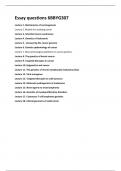
-
Essays on cancer genetics topics 6BBYG307
- Essay • 61 pages • 2024
-
- £25.49
- + learn more
This document includes almost all topics covered in Cancer Genetics module at Kings College London. The essays cover all the lecture contents and some additional reading done on the topic. Each essay has been structured with an introduction and conclusion on the topic. Learning these can help effectively structure your exam essay. The topics included are: Mechanisms of carcinogenesis, Inherited cancer syndromes, Genetics of leukaemia, Uncovering the cancer genome, Genetic epidemiology of cance...

-
Lecture 5. Uncovering the cancer genome
- Essay • 3 pages • 2024
-
- £5.49
- + learn more
This essay focuses on the contents of Uncovering the cancer genome. There may also be some additional readings. Cancer is a common complex disease, caused by a mix of the environment and genetics. Hereditary cancers are rare types of cancers that account for 5 to 10% of all cancer cases. Examples include the autosomal dominant Lynch syndrome which is associates with an increased risk of colorectal cancer and the autosomal recessive Fanconi Anaemia which increases the risk of leukaemia. Sporadic ...
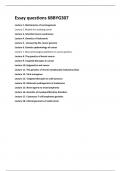
-
Lecture 1. Mechanisms of carcinogenesis
- Essay • 5 pages • 2024
-
- £5.49
- + learn more
Lecture one focuses on the Mechanisms of carcinogenesis. The lifetime risk for any individual to develop cancer is 50%. 38% of these cases are preventable, including melanoma, lung cancer and breast cancer. 15% of cancer cases are related to smoking and 3%-10% are related to obesity. Predisposing factors to cancer include toxins, inflammation and immunity, genetic mutations, hormones and ethnicity. Risk factors include occupation, family and medical history, age, gender, ethnicity, genes, immuni...
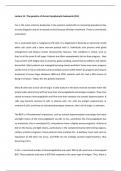
-
Lecture 11. The genetics of chronic lymphocytic leukaemia (CLL)
- Essay • 5 pages • 2024
-
- £7.49
- + learn more
This essay focuses on the contents of The genetics of chronic lymphocytic leukaemia (CLL). There may be some additional reading. CLL is the most common leukaemia in the western world with an increasing prevalence due to early diagnosis and an increased survival because of better treatment. There is some family association.CLL is associated with a malignancy of B cells. It is diagnosed in blood by an abnormal raised white cell count and a bone marrow packed with it.
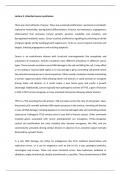
-
Lecture 3. Inherited cancer syndromes
- Essay • 3 pages • 2024
-
- £5.49
- + learn more
This essay focuses on the inherited cancer syndromes. Some examples include Lynch syndrome, familial adenomatous polyposis (FAP), BRCA1/2 related disease, multiple endocrine neoplasia and Li-Fraumeni syndrome. Lynch syndrome is caused by impaired DNA repair, FAP is caused by a faulty TSG, BRCA1/2 related disease is caused by impaired double stranded break repair and Li-Fraumeni syndrome is associated with TP53 defects.
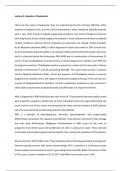
-
Lecture 4. Genetics of leukaemia
- Essay • 3 pages • 2024
-
- £6.49
- + learn more
This essay focuses on the contents of Genetics of leukaemia. There are four types of leukaemia, they are characterised by the cell type affected, either myeloid or lymphoid cells, and the clinical presentation, acute leukaemia typically presents with a very short history of rapidly progressing symptoms and chronic leukaemia presents with long history of very slowly progressive symptoms. Acute leukaemia are often considered curable conditions whereas chronic leukaemia are generally not, though re...

£5.50 for your revision notes multiplied by 100 fellow students... Do the math: that's a lot of money! Don't be a thief of your own wallet and start uploading yours now. Discover all about earning on Stuvia


